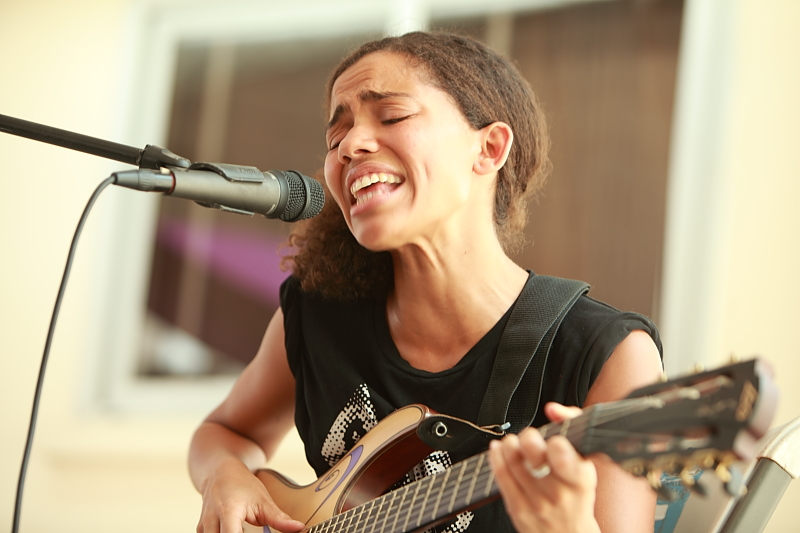African Women’s Organization Partners with Nigerian Artist NNEKA to Promote Women’s Rights Through the Arts
Originally published at Gender Across Borders.
On Thursday, February 16th, 2012, the African Women’s Development Fund (AWDF) hosted an event at their headquarters in East Legon, Accra, Ghana to officially ‘out-door’ musician and activist, Nneka Egbuna (“NNEKA”) as their Ambassador for the Arts.

Invited guests included Professor Ama Ata Aidoo (internationally acclaimed feminist African writer and academic), Nana Oye Mansa Yeboah, Chairperson of the Akuapem Community Foundation, and a diverse number of African women artists including Yasmeen Helwani Nsiah, Lady Jay Wah of Pidgen Music, Anita Erskine, Sherrifa, and Stephanie Benson.
Women’s rights organisations were also well represented including Adowa Bame of WISE (Women’s Initiative for Self Empowerment), Lucy Mensah of WUAGG (Women United Against Aids in Ghana), Â and Patricia Blankson-Akakpo of NETRIGHT (Network of Women’s Rights in Ghana).
The African Women’s Development Fund was founded 11 years ago by three inspirational women – Hilda Tadria, Joanna Foster and Bisi Adeleye Fayemi, who was also AWDF’s founding Executive Director until last year. They created an amazing organisation aimed at supporting women organisations in their work to make real change in women’s lives – to ensure the recognition and implementation of ALL women’s human rights (economic, social, cultural, political etc) across Africa.
Their continuous, dedicated efforts, despite the immediate concerns facing women in Africa, are commendable. Their milestones speak for themselves; in partnership with numerous organizations, AWDF has provided over 19 million dollars in grants to more than 800 organisations in 42 African countries. Yet, AWDF continues to push the envelope; their decision to include the Arts and Sports as two new thematic areas is just one of the ways that this organization demonstrates their commitment to implementing long-terms solutions in Africa.
In her welcome speech, interim CEO, Theo Sowa, emphasized the potential impact of leveraging the power of music and the arts as a platform for change:
The arts can be powerful catalysts of such individual and collective understandings. Artists can produce works that translate dusty words into clear and heartfelt understandings of issues and ways of dealing with them. Art can touch the souls as well as the minds of countless people, inspiring passion, anger, joy and other emotions that can catalyse action in ways that court cases and academic lectures and even protest marches may never achieve. Art can bring information and meaning into lives in ways that can be more real, more grounded and more influential than any number of texts. Arts – traditional or modern – are integral to our cultural lives… and changes in social, economic and political arenas will never truly take root without parallel changes in our cultural norms, beliefs and practices.

According to Nana Sekyiamah, Communications Office at AWDF, the decision to invite NNEKA to be the organization’s first Ambassador for the Arts, was in part due to her “incredible passion, and commitment to using her gift of music as a means of provoking social change.” Sekyiamah added that “Nneka’s message is hard hitting in the issues she addresses (corruption, exploitation, the environment) yet its a message of one love and hope.”
The daughter of a Nigerian father and a German mother, NNEKA was born in Warri, Oil City in the Delta region of Nigeria at the height of its new found wealth in the mid 70s. Her lyrics reflect much of her history and life in Nigeria as well as her time spent in Western Europe. Her songs stress the issues of capitalism, poverty and war and are often loaded with moral and biblical messages and references, with some music commentators comparing her to Erykah Badu, Neneh Cherrynd Floetry.
Yesterday, NNEKA performed during the event and shared her thoughts on becoming the AWDF’s Arts Ambassader via a short video interview. During the interview, she shares, “It’s easier to use music [to promote change] than to stand up at a podium,” thoughts similar to that of Ama Ata Aidoo, who closed her speech by recognizing the power of music and the arts to change people’s lives.
I have seen traumatised children respond and come to life in music workshops; have seen communities that have been fighting for years come together over games of football; have seen the power of film to touch people’s hearts and change their thinking; have experienced writers whose works have changed my life and motivations.
Learn more about the Africa Women’s Development Fund (AWDF) at their website, www.awdf.org.
